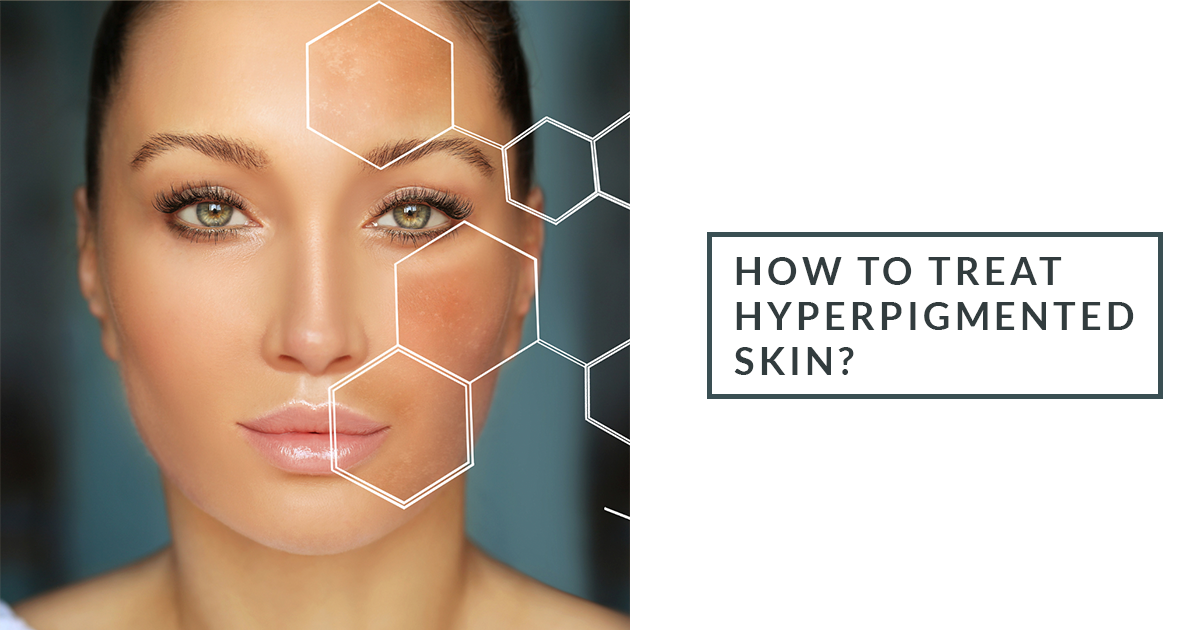How to treat hyperpigmented skin?

Hyperpigmented skin needs special care and attention to heal and recover back to normalcy. Treating hyperpigmentation is not an easy task. Apart from the best skin care products, it is important to be consistent and regular with your skincare routine. With this blog, we are going to provide you with some effective solutions on how to treat hyperpigmented skin. Let's begin!
What is hyperpigmentation?
Hyperpigmentation is a clinical term used to define skin condition resulting in dark patch causing uneven discoloration of the skin.
Forms of hyperpigmentation
The hyperpigmented skin areas may be ranging from tiny spots to large patches covering the face, nape of the neck, or body. Patches may be pigmented in form of mild, moderate, or extensive discoloration depending on the intensity of hyperpigmentation. They may be in form of -
- Age spots or liver spots.
- Acne spots.
- Sunspots or solar lintigenes.
- Freckles on cheeks or under eyes.
- Melasma or chloasma.
- Post-inflammatory hyperpigmentation due to skin issues like eczema.
Hyperpigmentation may begin as small, tiny multiple spots which may later coalesce to form bigger dark discolored patches.
Causes of hyperpigmentation
The causes of hyperpigmentation are as follows-
- Hormonal changes especially in the case of thyroid issues.
- High cholesterol levels cause lipid peroxidation.
- Long-time sun exposure or photosensitivity.
- Nutrient deficiencies like anemia.
- Pregnancy or post-partum skin condition.
- Skin inflammation due to acne, fungal infection, or eczema.
- Autoimmune disorders like lupus or lichen planus pigmentosa.
- Pigmentation disorders due to hyper melanosis.
- Menstrual disorders like PCOS may result in acanthosis nigricans. (hyperpigmented neck).
- Hypersensitivity reaction to certain medications especially anti-depressants.
- High sugar levels in the case of diabetes may result in skin darkening.
- Using excessively pigmented makeup products.
- Not removing makeup at bedtime.
How does hyperpigmentation occur?
Hyperpigmentation occurs due to an increase in the secretion of skin pigment called melanin which provides color to the skin. This may occur due to hormonal imbalance when there is the hypersecretion of the MSH (Melanocyte Stimulating Hormone) causing the skin cells or melanocytes to secrete more pigment or melanin causing hyperpigmentation. Hyperpigmentation of the skin occurs due to overexposure to the sun, hormonal imbalance, or certain skin inflammatory diseases.
Symptoms of hyperpigmentation
The symptoms of hyperpigmentation are as follows-
- Discolored skin.
- Uneven skin tone.
- Rough skin texture.
- Dull dehydrated skin.
- Itching of the skin.
- Burning sensation on the skin.
- Peeling or scaling of the skin.
- Redness of the skin.
Impact of hyperpigmentation.
It is important to remember that hyperpigmentation is not a serious or contagious condition. However, it can affect the quality of life of an individual. It can hamper self-confidence as it has a major impact on the looks and personality of an individual. It can cause a negative impact on one’s appearance affecting morale and self-esteem creating a stressful condition.
How to treat hyperpigmentation?
Here are the best solutions to treat hyperpigmentation with effective measures.
Treat the cause.
Treating the cause of hyperpigmentation can help eliminate the problem from the root cause. It is important to know why hyperpigmentation occurs. Once you identify the cause of the hyperpigmentation problem, it is easy to eliminate it.
Control the triggering factors.
Preventing triggering factors can control the problem of excessive melanin secretion causing hyperpigmentation. Long-term exposure to the sun is one of the major triggering factors for hyperpigmentation.
Skincare is essential.
Here are some essential skincare tips which you must follow-
- Use natural skincare brightening formulations.
- Remove your makeup before bedtime.
- Wear high-SPF sunscreen during winter.
- Natural Vitamin C serum helps to reduce pigmentation.
- Ensure to follow the CTM procedure for healthy skin.
- Use squalene and Vitamin E-based moisturizers.
- Use natural skin toner enriched with CoQ10.
- Use natural hyaluronic acid-based serums for lightening skin.
Healthy lifestyle practices.
Eat antioxidant-rich food which may help prevent oxidative stress and free radical damage. Follow detoxification for a healthy clear gut which helps in even skin tone. Keep body and skin hydrated with plenty of water. Avoid packaged and oily food which may result in lipid peroxidation causing skin darkening on the face or the nape of the neck. Ensure to reduce the intake of sugary foods which trigger hyperpigmentation of the skin.
Destress to control hormone levels.
It is important to maintain a healthy hormonal balance. The chronic build-up of stress increases cortisol (stress hormone) levels which can result in hormonal imbalance. Mediation and exercise can help release “feel-good hormones” for naturally glowing flawless skin.
Check for nutritional deficiency and overload.
It is important to check for nutritional deficiency of vitamins, and minerals to prevent hyperpigmentation. Ensure to check your hemoglobin and iron levels regularly. Lack of iron or serum ferritin levels can result in a low oxygen supply resulting in dull uneven skin tone. However, excessive overload of iron can cause hemochromatosis resulting in skin darkening.
Maintain skin immunity.
Maintaining a healthy skin barrier is important to prevent any kind of skin inflammatory changes such as acne, fungal infection, or eczema. It is important to consume a high-protein diet to help boost collagen synthesis and the healing process of the skin at optimum levels.
Follow these simple tips to prevent and control hyperpigmentation.